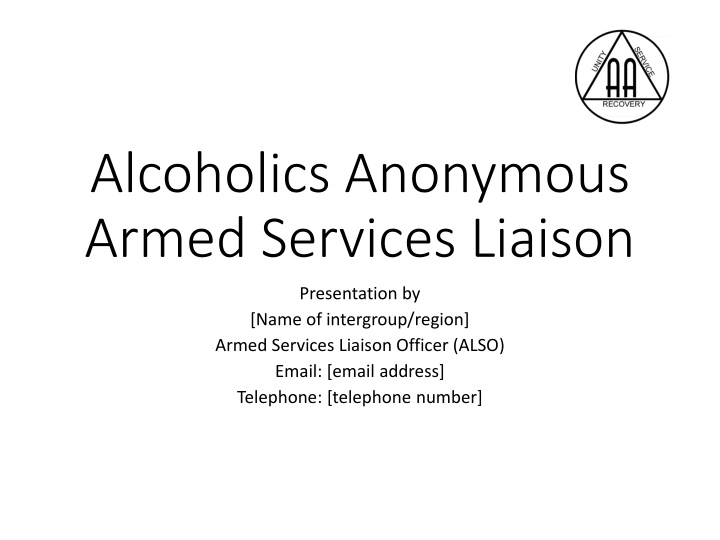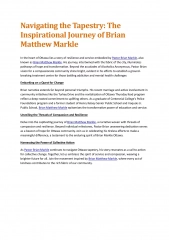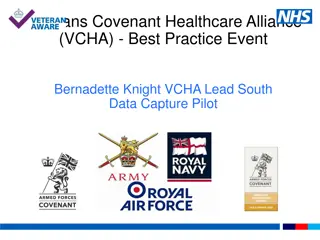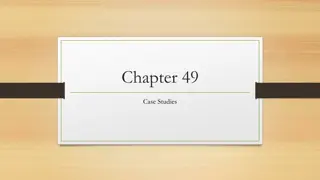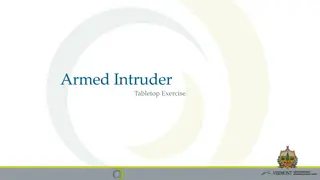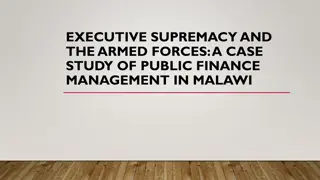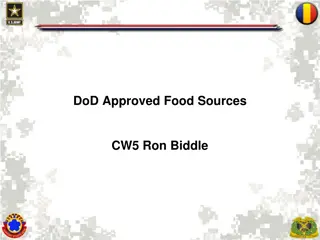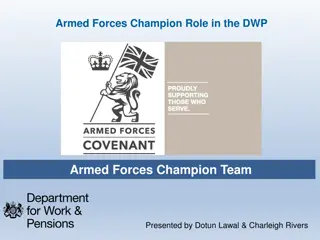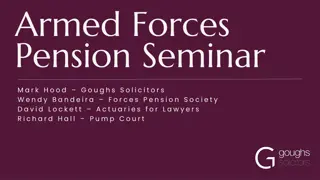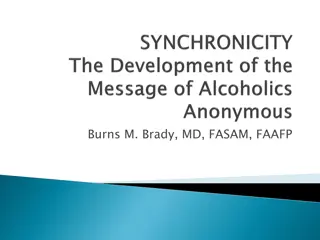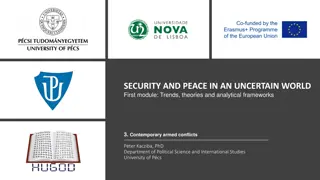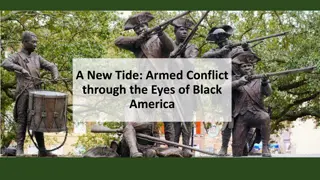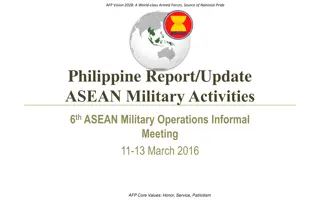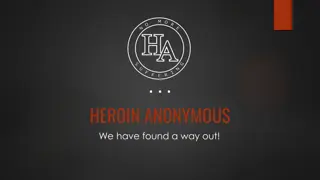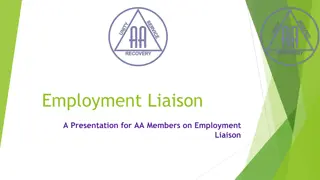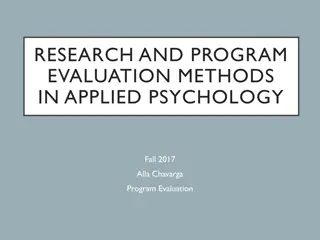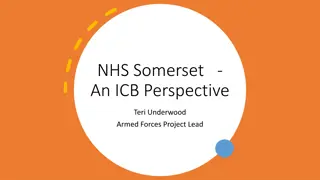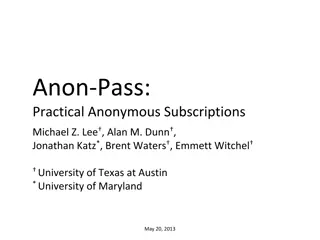Alcoholics Anonymous Armed Services Liaison
Alcoholics Anonymous Armed Services Liaison Presentation providing insights on AA, alcoholism, AA's purpose, reach, and availability, as well as the role of ASLOs in the recovery process. Includes AA Preamble, basic facts, defining alcoholism, and the importance of complete abstinence.
Download Presentation

Please find below an Image/Link to download the presentation.
The content on the website is provided AS IS for your information and personal use only. It may not be sold, licensed, or shared on other websites without obtaining consent from the author.If you encounter any issues during the download, it is possible that the publisher has removed the file from their server.
You are allowed to download the files provided on this website for personal or commercial use, subject to the condition that they are used lawfully. All files are the property of their respective owners.
The content on the website is provided AS IS for your information and personal use only. It may not be sold, licensed, or shared on other websites without obtaining consent from the author.
E N D
Presentation Transcript
Alcoholics Anonymous Armed Services Liaison Presentation by [Name of intergroup/region] Armed Services Liaison Officer (ALSO) Email: [email address] Telephone: [telephone number]
Contents AA preamble / Basic facts about AA / What is an alcoholic? / Who would AA benefit? / Armed Services Liaison Officer (ALSO) / ASLOs reach out to / The twelve-step programme / The higher power / The AA experience / AA s availability / What else AA does and does not do / How to access AA / AA and the armed services / Our sister fellowship: Al-Anon / My own story / Video presentation / Questions and answers
AA Preamble (read at the start of most meetings) Alcoholics Anonymous is a fellowship of men and women who share their experience, strength, and hope with each other that they may solve their common problem and help others to recover from alcoholism. The only requirement for membership is a desire to stop drinking. There are no dues or fees for AA membership; we are self-supporting through our own contributions. AA is not allied with any sect, denomination, politics, organisation, or institution; does not wish to engage in any controversy; neither endorses nor opposes any causes. Our primary purpose is to stay sober and help other alcoholics to achieve sobriety.
Basic facts about AA Key points from the preamble: Purpose: stay sober; help others to stay sober; Open to anyone who wants to stop drinking. Founded in Akron, Ohio on 10 June 1935 by two alcoholics, Bill Wilson and Dr Bob Smith, who found that they could stay contentedly sober by joining together to apply a simple programme of action. Currently over 2 million members worldwide; many more members over its > 80-year history. Widespread in most countries. > 4,600 autonomous groups hold meetings every week in England, Scotland, and Wales. Provides a lifelong solution to alcoholism through fellowship, recovery, and service. Inspiration for many other twelve-step fellowships.
What is an alcoholic? Diagnosis: in AA s understanding, an alcoholic is a person who has lost control of their drinking and therefore their life: Drinking is giving rise to unacceptable consequences; The person cannot moderate the quantity; The person cannot stop altogether. The actual quantity drunk is irrelevant: it is the loss of control when drinking that matters. Prognosis: our experience is that, left untreated, the condition is Progressive (it worsens over time); Incurable (once control over quantity is lost, it is rarely regained); Fatal (through the direct action of alcohol, disease, suicide, or misadventure). For such a person, complete abstinence is the only viable option. AA helps many people to remain completely abstinent who could not do so alone. Our experience is that a complete and permanent return to health is possible.
Who would AA benefit? Not every problem drinker and not everyone who is alcohol- dependent (according to a medical definition) would necessarily benefit from attendance at or membership of AA: many problem drinkers moderate or stop spontaneously, following a grave incident or warning, or on the basis of an intervention. AA most benefits those for whom other measures and interventions fail to produce long-term moderation or abstinence. AA can also help people who might not be diagnosable as alcohol-dependent according to a medical definition but who are nonetheless suffering consequences from their drinking, can t moderate, and can t stop. Many people come to AA very early in the progression of the condition, with careers, jobs, health, and home lives still largely intact.
Armed Services Liaison Officer (ASLO) AA in Great Britain is divided into 15 regions (plus a 16th: English-speaking AA in continental Europe). Each region is sub-divided into several intergroups . The groups band together into these intergroups and regions for public information and other work. Each region and each intergroup appoints an ASLO. The ASLO provides a public information and liaison function: To provide information about AA. To facilitate individuals access to AA.
ASLOs reach out to The British Army, the Royal Navy, the Royal Air Force HIVES Medical services Welfare services Chaplaincy Units NHS agencies involved with the services and veterans Other public agencies Services and veterans charities
The twelve-step programme Admission that one can neither moderate nor stop drinking alone. Commitment to a programme of action. Resolution of past and present conflicts (external and internal). Restoring relationships with others through forgiveness and amends. Renewed commitment to the principle of service to others within AA and outside AA.
The higher power AA s twelve steps make reference to a power greater than ourselves or higher power . AA members variously conceive of this as: God in a traditional sense; A spirit of the universe in a less traditional sense; The knowledge, advice, support, and encouragement of other AA members who have successfully stayed sober. AA thus happily accommodates theists, atheists, agnostics, and everything in between: members of all religions, and members of none. No religious adherence, affiliation, or belief is required.
The AA experience AA members Typically attend one or more meetings a week, usually the same ones from week to week; Build relationships with other group members; Work through the twelve-step programme with a mentor (termed a sponsor in AA); Act as sponsors to others; Run AA groups and the structure of AA as a whole; Carry AA s message to those in society AA could help.
AAs availability Website available 24 hours a day, including a chat now and email facility, for enquiries about AA. Telephone service, with coverage 7 days a week throughout most of Great Britain, also for enquiries about AA. AA literature (books and pamphlets) available online and to purchase at cost price from meetings and the AA website. This supports and supplements attendance and participation. AA groups throughout the country, each with one or more meetings a week, for initial and ongoing help. One-to-one help from other AA members 24 hours a day, 365 days a year, once contact is made at a local group. There are no waiting lists; no appointments or referrals are necessary. AA cooperates with other agencies and organisations to provide information and facilitate access.
What else AA does and does not do There are no membership registers. AA upholds the principles of confidentiality and anonymity. No specific commitment is required: members may join and leave, attend, and participate as they wish and to the extent they wish. AA attendance is free of charge, but we hold voluntary collections at meetings to cover costs. AA accepts no outside contributions or funding. There is no professional class of therapists or counsellors. The help provided by AA members to each other is for fun and for free, expecting nothing in return. AA does not refer people to other organisations or perform formal diagnoses. AA has no opinion on outside issues, on the recovery industry, or on other agencies and organisations approach to problem drinkers. AA does not claim to have a monopoly on recovery: many members dovetail AA membership and participation with other programmes.
How to access AA Visit: https://www.alcoholics-anonymous.org.uk/. Access the chat now service on the AA website here: https://www.alcoholics- anonymous.org.uk/About-AA/Newcomers/Get-help-now. Call 0800 9177 650. Email help@aamail.org. Arrange for an AA member with armed services experience to make contact with a prospective member by telephone to provide information and facilitate attendance, through an armed services liaison officer. This service can also be requested through the chat now , telephone, or email service. We encourage meeting attendance as a way of finding out about AA: face-to- face experience is more effective than providing information over the phone or in writing. We encourage people to attend meetings at different groups: each group is autonomous and varies in atmosphere and style, despite the common purpose of sobriety.
AA and the armed services Serving persons may attend AA independently of any other measures taken to address their problem drinking. No formal referral or appointment is required. Attendance is outside the wire, preserving anonymity. AA is available throughout the world, including in most countries where individuals might be posted. AA help is available also by phone and printed media and through Skype, chat rooms, email, and other online resources for members in remote locations.
Our sister fellowship: Al-Anon Alcoholism profoundly affects the families of alcoholics. Al-Anon Family Groups ( Al-Anon ) provide support to anyone whose life is, or has been, affected by someone else s drinking, regardless of whether that person is still drinking or not. AA and Al-Anon are separate organisations. Call 020 7403 0888. Go to https://www.al-anonuk.org.uk/. Al-Anon also provides assistance to teenagers in families affected by alcoholism.
My own AA story How I knew I was an alcoholic. How I came to AA. How I recovered through AA. Why I volunteer my time to carry AA s message to professionals and others.
Video presentation A video made about AA members who are current/former members of the armed services: https://www.alcoholics- anonymous.org.uk/Professionals/Videos-for- Professionals
